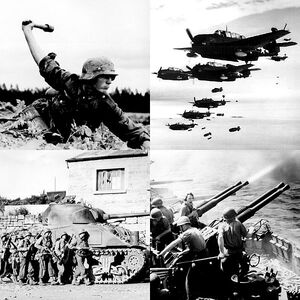
The Global War was a planet-wide conflict that started in 1939 and ended de facto by the late 1940s. It involved many of the world's countries including all major powers except the C.N.A. The war pitted an alliance of Great Britain, France, Japan, and other countries against that of Germany and the U.S.M. It was the most devastating conflict in world history and changed the balance of power decisively.
Causes of the War
The 1920s and 1930s saw growing tension between Great Britain and the Germanic Confederation, as the Germans began to expand into British spheres of influence in Africa and Asia. German businessmen had received oil concessions in the Ottoman Empire, and the Germans were enlarging their military.
Elections in Germany, Britain, the C.N.A., and the U.S.M. from November 1937 to March 1938 made war all but inevitable. Karl Bruning's Deutschland Party was victorious in the German elections of 5 November, while Prime Minister George Bolingbroke's Tories retained control of the House of Commons in Britain's Parliamentary elections later that month. In the C.N.A., Douglas Watson's Liberal Party was defeated by the anti-war People's Coalition candidate Bruce Hogg in February 1938. And in the U.S.M., the following month, the peace candidate, Governor Richard Brace of the United Mexican Party, was defeated by incumbent President Alvin Silva of the Liberty Party. By 1939, all of the world's leaders expected war to come.
War Breaks Out

The Shah of the Ottoman Empire had been playing British and German oil interests against each other ever since granting the Germans their first oil concession in 1933. The Arab nationalist Abdul el Sallah did the same, promising both the British and German governments that he would favor them in the event of a successful Arab revolt.
When the Arab Revolt broke out on 5 August 1939, el Sallah was able to rally the Ottoman Empire's Arabs to his cause. However, following his defeat at the Battle of el Khibir on 10 September, el Sallah could no longer keep up his pretense of favoring both European powers. Forced to choose, he chose to call upon the Germans for help, and at a council meeting on 16 September, Chancellor Bruning elected to send elements of the air arm to Arabia to "buttress the Arab position." German aircraft began landing in Arabia on 19 September, and by the 21st there were 6000 elite German troops there.
Bolingbroke met with his cabinet on the morning of 20 September to request that 10,000 marines from Victoria be sent to Constantinople. By the evening, 3500 British marines were airlifted to Arabia, and another 20,000 were sent to Constantinople by ship. The military forces of the two European powers fought near Damascus on 30 September, leading to declarations of war by Germany, Britain, and France by 3 October.
European Front and North American Neutrality
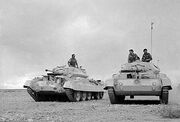
The first six months of the war saw a series of German victories. Two German armies invaded France and quickly crushed the inferior and poorly-equipped French army, taking Paris on 17 November and forcing the French government to capitulate on 27 November. The Germans also won a series of battles against British and Ottoman forces in Arabia, ultimately taking the Victoria Canal and Alexandria on 25 December. The only reverse the Germans suffered was the defeat of an attempt to invade Great Britain on 1 December.
These German victories prompted Spain to abandon its pre-war alliance with Great Britain and declare neutrality, while Italy ended its neutrality to sign a military pact with Germany. The Ukraine and several of the Russian states formed an anti-German alliance, but most remained neutral until war broke out in the former Russian Empire in 1947.
The outbreak of war in Europe in October led Governor-General Hogg to order the North American merchant marine to remain in coastal waters. He also placed the coast artillery on alert, then proclaimed North American neutrality, giving a speech on 3 October in which he stated, "We are the enemy of war itself, not of any nation. We shall defend outselves against attack, but shall take no action either side could consider belligerent. North America is at peace. North America will remain at peace. I give you my word on this."
Both Bolingbroke and Bruning attempted to win North American support, the former instructing his ambassador to Burgoyne "to stress the implicatons of a German victory in the Atlantic," the latter offering the C.N.A. "a share in a new world order, a partnership of equals after the aggressors are destroyed." Hogg rebuffed both appeals, stating at a Cabinet meeting on 10 November, "The war is going badly for Britain and France, but this is temporary. Soon we may expect a stalemate in Europe, as both sides will have exhausted themselves in a futile exercise in destruction."
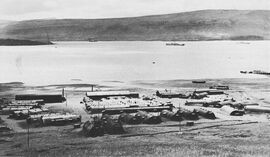
The fall of France and the conquest of the Victoria Canal brought about a change in Hogg's policies, and in North American opinion on the war. In December 1939 Hogg belatedly established a Commission on the Defense Effort to begin preparing for possible involvement in the war. The following month, Hogg and Premier Olaf Henderson of Iceland announced a mutual defense pact, and the month after that the C.N.A. began channeling covert military aid to the British through a North American military base in Iceland. At first, the North Americans maintained the fiction that the weapons and other aid were being stolen from the base, but by late 1943 British pilots were openly ferrying warmobiles from Iceland to the British Isles.
In July, Hogg met with Liberal leaders, including Watson and Hugh Devenny, and invited them to join a "unity government". They agreed, and Watson became Minister for Foreign Affairs, while other Liberals took lesser Cabinet posts. Devenny told reporters after the meeting that "there will be a political moratorium until the 1943 elections."
The Germans concluded their conquest of the Ottoman Empire in 1940, and late in that year three German armies crossed into India, while a large German naval force entered the Indian Ocean to provide military and logistical support. By the end of 1941, the German conquest of India was complete, and the following year saw the Germans drive the Japanese from Indo-China and invade the Dutch East Indies.
Pacific Front
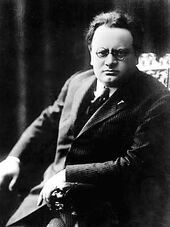
In Mexico City, President Silva was mildly surprised and disappointed to see the war begin in the Middle East rather than the Pacific. Silva had become fixated on Japan and China, and he had hoped to see his German ally become involved in east Asia. At first, he cheered the Germans on, though he turned down Bruning's request for assistance against the Ottoman Empire. As the war went on, and Germany's victories mounted, Silva began to have doubts about his German alliance. If Bruning succeeded in defeating the British and their Indian, Australian, and Japanese allies, he would become the most powerful man in the world, and the U.S.M. would be relegated to the status of a second-rate power.
Silva spent the first years of the war enlarging the Hawaii arsenals and increasing the proficiency of Mexico's armed forces. Sometime late in 1941, as the Germans were completing the conquest of India and preparing to invade Indo-China, Silva determined to enter the war. In early December, just before the fall of Pondicherry, Silva signed a secret treaty with Siberia allowing Mexican troops to be stationed there. On 1 January 1942, airmobiles from carriers of the Mexican Pacific Fleet attacked Tokyo, while aircraft based in Siberia struck Nagasaki, and Mexican and Siberian troops invaded China. The Siberian-Mexican alliance conquered Manchuria and occupied much of northern China, and the Mexican Navy took Midway, Guam, the Marshall Islands, the Marianas Islands, and other island groups in the Pacific. The Mexican Navy also carried out amphibious invasions of Taiwan and Honshu, but both failed.
The Mexican attack did not come as a surprise to the Japanese; executives from Kramer Associates had met secretly with government officials in Tokyo in 1939 and 1940 to warn them of Silva's plans. In 1940, Kramer Associates President John Jackson proposed an informal alliance between Japan, Australia, and K.A. "to guarantee peace in the Pacific, and, more particularly, defend the area against a potential Mexican challenge." The Japanese and Australian governments agreed to the alliance, so that when the Mexican-Siberian attacks occurred, the Japanese were ready. Kramer Associates ultimately spent over N.A. £20 billion subsidizing anti-Mexican efforts in China, and a similar amount doing the same in the rest of the Pacific region.
The Tide Turns
The German invasion of the Dutch East Indies in late 1942 proved to be more than the German military machine could manage. Before the end of the year, the Germans were forced to withdraw from Borneo. The Australians drove off a German invasion attempt launched from New Guinea, as well as two Mexican attacks.

The turning point in the war came in mid-1944. In China, the Mexican-Siberian advance was halted, and then slowly driven back. In Europe, a fourth German attempt to invade Great Britain failed. In the Pacific, the unsuccessful amphibious assault on Honshu cost the lives of 26,000 Mexican and Siberian troops. In the second half of 1944, the Japanese retook Iwo Jima and the Marshalls from the Mexicans, and in December a Japanese aircraft carrier task force bombed Honolulu. San Francisco was bombed by the Japanese in March 1945, and by the summer of that year Silva was obliged to reinforce Hawaii against a possible Japanese invasion.
In Europe, there was an anti-German uprising in Paris that forced Bruning to withdraw troops from Africa. Other uprisings followed in Brussels, Amsterdam, and Warsaw, and the Germans found themselves facing widespread guerrilla warfare among their European conquests. In September 1945 the Berlin Opera House was bombed only minute before Bruning was due to arrive to deliver a speech. Bruning ordered hostages taken in every city that rioted, and began a terror campaign against Europe's civilian population that saw over 1 million people killed during the next year. The terror campaign ended when the Deutschland Party lost its majority in the Diet in the August 1946 elections. Bruning attempted to suspend the Diet, but instead was himself arrested on the evening of 18 August.
Stalemate
Bruning was succeeded by Heinrich von Richter of the Democratic Party, who withdrew all but token forces from India and the former Ottoman Empire, while allowing elections to take place among the occupied nations of Europe. By 1948, new governments had been established, and most of the guerrilla fighting had ended. However, von Richter refused to agree to an armistice with the British, and the war continued in theory if not in fact.
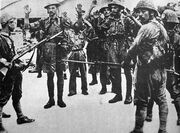
In the Pacific, the Chinese and Japanese had forced the Mexican-Siberian army out of China by the beginning of 1947. Two Japanese armies invaded Siberia, which touched off a new series of wars among the Russian successor states known as the Time of Troubles that lasted until 1955. Meanwhile, the Australians drove the Mexicans from their Pacific conquests, forcing them to withdraw from Hawaii.
By the end of 1948, the Japanese had completed the conquest of Siberia, and in December launched simultaneous amphibious invasions of Hawaii and the Aleutian Islands in Alaska. Both invasion attempts were unsuccessful, and the Japanese suffered such heavy losses that they ended offensive operations against the Mexicans. Silva, on his part, refused to sign a peace treaty with the Japanese and Australians, and in theory the war in the Pacific, like that in Europe, continued.
Aftermath
The war left Germany as the dominant power in Europe and the Middle East, and Japan and Australia as the major powers in the Pacific, though both were dependent on Kramer Associates. Nationalist revolts in Africa ended European colonialism there, while China and Indo-China became battlegrounds for rival warlords.
The U.S.M. suffered the loss of its Siberian client state, as well as 3.9 million combat deaths among its armed forces. In addition, Silva's cancellation of national elections in 1944 led to the national uprising called the Rainbow War, which lasted until the early 1950s. Silva was widely blamed for the defeats in China and Siberia, and when he was finally forced to hold elections in January 1950, the violence that accompanied them led to a military coup in the U.S.M.
The C.N.A. never formally entered the war, and was spared the death and destruction that visited the rest of the world. This led to a widespread feeling of guilt among the people of North America, and prompted Councilman Richard Mason to propose a massive program of foreign aid to rebuild the war-torn nations. Mason rode the wave of guilt to win the 1953 Grand Council elections and become Governor-General.
| COUNTRY | TOTAL ARMED FORCES | TOTAL COMBAT DEATHS |
|---|---|---|
| German Empire | 12,500,000 | 3,800,000 |
| China | 13,000,000 | 4,100,000 |
| Japan | 6,000,000 | 1,300,000 |
| U.S.M. | 12,000,000 | 3,900,000 |
| United Empire | 12,500,000 | 2,700,000 |
| All Others | 19,000,000 | 9,600,000 |
| TOTAL | 75,000,000 | 25,400,000 |
Total casualties from the Global War amounted to 25.4 million dead and 50 million injured among combatants, and 35 million dead and 30 million injured among civilians, as well as 25 million deaths resulting from the influenza epidemic of 1946-47.
Sources
Sobel's sources for the Global War are Field Marshal Sir Alexander Hunter's A Military History of the Global War (London, 1957), Hans Schuster's The War of the World (New York, 1958), James Radamaker's Secret Files of the Global War: Correspondences With North America, 1939-1941 (Melbourne, 1959), Dominick Fea's The Cost (New York, 1959), Miguel Alavarces' The Global War: A Diplomatic History (Mexico City, 1960), a letter to Sobel from Stanley Tulin dated 1 December 1970, and Sobel's own interviews with Stanley Tulin in late 1970 and early 1971.
This was the Featured Article for the week of 23 December 2012.
| C.N.A. Historical Eras |
|---|
| American Crisis • North American Rebellion • Four Viceroys • Britannic Design • Dickinson Era • Trans-Oceanic War • Era of Harmonious Relations • Crisis Years • Rocky Mountain War • Era of Faceless Men • Age of Renewal • Bloody Eighties • Creative Nationalism • Starkist Terror • Years of the Pygmies • Malaise Years • Diffusion Era • Global War • New Day • War Without War |